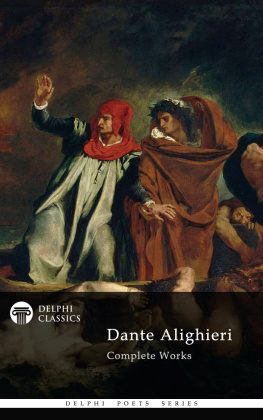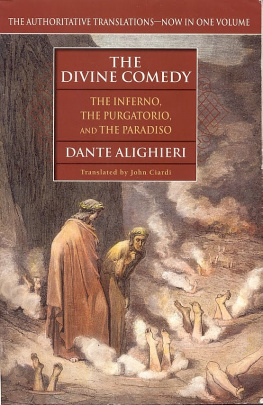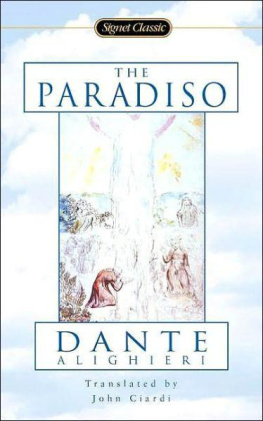Durling Robert M - Paradiso: The Divine Comedy of Dante Alighieri
Here you can read online Durling Robert M - Paradiso: The Divine Comedy of Dante Alighieri full text of the book (entire story) in english for free. Download pdf and epub, get meaning, cover and reviews about this ebook. year: 2011, publisher: Oxford University Press USA - OSO, genre: Science. Description of the work, (preface) as well as reviews are available. Best literature library LitArk.com created for fans of good reading and offers a wide selection of genres:
Romance novel
Science fiction
Adventure
Detective
Science
History
Home and family
Prose
Art
Politics
Computer
Non-fiction
Religion
Business
Children
Humor
Choose a favorite category and find really read worthwhile books. Enjoy immersion in the world of imagination, feel the emotions of the characters or learn something new for yourself, make an fascinating discovery.

- Book:Paradiso: The Divine Comedy of Dante Alighieri
- Author:
- Publisher:Oxford University Press USA - OSO
- Genre:
- Year:2011
- Rating:4 / 5
- Favourites:Add to favourites
- Your mark:
- 80
- 1
- 2
- 3
- 4
- 5
Paradiso: The Divine Comedy of Dante Alighieri: summary, description and annotation
We offer to read an annotation, description, summary or preface (depends on what the author of the book "Paradiso: The Divine Comedy of Dante Alighieri" wrote himself). If you haven't found the necessary information about the book — write in the comments, we will try to find it.
Paradiso: The Divine Comedy of Dante Alighieri — read online for free the complete book (whole text) full work
Below is the text of the book, divided by pages. System saving the place of the last page read, allows you to conveniently read the book "Paradiso: The Divine Comedy of Dante Alighieri" online for free, without having to search again every time where you left off. Put a bookmark, and you can go to the page where you finished reading at any time.
Font size:
Interval:
Bookmark:
THE DIVINE COMEDY
OF DANTE ALIGHIERI
Edited and Translated by
ROBERT M. DURLING
Introduction by
ROBERT M. DURLING
Notes by
RONALD L. MARTINEZ
AND ROBERT M. DURLING
Illustrations by
ROBERT TURNER
Volume 3
PARADISO


Oxford University Press, Inc., publishes works that further
Oxford Universitys objective of excellence
in research, scholarship, and education.
Oxford New York
Auckland Cape Town Dar es Salaam Hong Kong Karachi
Kuala Lumpur Madrid Melbourne Mexico City Nairobi
New Delhi Shanghai Taipei Toronto
With offices in
Argentina Austria Brazil Chile Czech Republic France Greece
Guatemala Hungary Italy Japan Poland Portugal Singapore
South Korea Switzerland Thailand Turkey Ukraine Vietnam
Translations Copyright 2011 Robert M. Durling
Editorial material Copyright 2011 Robert M. Durling and Ronald L. Martinez
Illustrations Copyright 2011 Robert Turner
Published by Oxford University Press, Inc.
198 Madison Avenue, New York, New York 10016
www.oup.com
Oxford is a registered trademark of Oxford University Press
All rights reserved. No part of this publication may be reproduced,
stored in a retrieval system, or transmitted, in any form or by any means,
electronic, mechanical, photocopying, recording, or otherwise,
without the prior permission of Oxford University Press.
Library of Congress Cataloging-in-Publication Data
Dante Alighieri, 12651321
[Divina commedia. English & Italian]
The divine comedy of Dante Alighieri / edited and translated
by Robert M. Durling; introduction and notes, Ronald L. Martinez
and Robert M. Durling; illustrations by Robert Turner.
p. cm.
Includes bibliographical references and index. Contents: v. 3. Paradiso
ISBN: 978-0-19-508742-0
I. Durling, Robert M. II. Title.
PQ 4315.D87 2010
851.1dc20 95-12740
1 3 5 7 9 8 6 4 2
Printed in the United States of America
on acid-free paper
For the principles followed in the translation of the Paradiso, we refer the reader to the preface to our Inferno volume, and for the Italian text to the preface to our Purgatorio volume. As we write, a major advance in the textual criticism of the Comedy is taking place: the application to it of cladistic software (software developed to chart the relations among DNA strings, closely analogous with textual strings; see Shaws Monarchia 2006 and her 2010 DVD Commedia). This approach has already demonstrated its usefulness in its critique of the unreliability of stemmas based on only small samples of variants and its demonstration of the superiority of Petrocchis detailed analysis of all the variants in his chosen vulgata manuscripts; this software will eventually, as more and more manuscripts are compared by its means, lead to the possibility of a genuinely critical text. Petrocchis text is still the most reliable guide, and we have again, in the main, followed it, including discussion of the passages where we have not done so in Textual Variants, pp. 7623.
In Inter cantica sections concluding the notes to the individual cantos of the Purgatorio, we provided detailed discussions of their allusions to the corresponding cantos (as well as to other cantos) of the Inferno, demonstrating, we hope, that such comparisons can be extremely illuminating: Dantes mode of composition involved holding the entire poem present to his awareness, with or without (more probably, with) detailed outlines. Such references, now involving two cantiche, become particularly dense and frequent in the Paradiso. For this reason, having offered the student a possible model for the exploration of the self-referentiality of the Comedy in the previous volume, we have here chosen a different method. The matter is necessarily treated to some extent in the body of the notes to each canto, but we have also included a number of Additional Notes discussing matters involving the entire poem, such as those on the figure of Beatrice, on the threshold cantos, on Dantes Neoplatonism and his astrology, and on the Paradiso as the Alpha and Omega of the poem.
The procedures followed by the commentators in this volume differ from the two previous ones in another respect. Rather than the editor of the volume imposing his view of the appropriate uniformity among its parts (except in the signed Additional Notes), as previously, for this volume we have composed the notes individually, as indicated in the table of contents.
As before, translations of biblical passages are from the Douay version of the Latin Vulgate, except as noted, and, unless otherwise identified, nonbiblical translations are our own. And once again the four indexes have been prepared by R.M.D. And special thanks to Norman Rabkin for his invaluable help with the correction of the proofs.
Paris
September 2010
R.M.D.
It is a pleasure to thank once again those who have generously read and commented on the manuscript. as a whole or in part, and whose encouragement and help have been precious to us: Albert R. Ascoli, Johannes Bartuschat, Nancy Vine Durling, Enrico Fenzi, John Freccero, Francesco Furlan, Frank LaBrasca, Richard Lansing, Pierre Laurens, Nicholas J. Perella, Gina Psaki, Norman Rabkin, John Rallo, Alain Segonds, and Prue Shaw; they have helped us avoid many errors and infelicities, and those that remain are entirely our own responsibility. We wish to express our gratitude also to the staffs of the Bibliothque Nationale de France, Sites Franois Mitterand and Richelieu, of the Bibliothque du Saulchoir (Paris), and of the libraries of the University of California at Berkeley. And once more the patience, forbearance, and active helpfulness of our wives, Nancy Vine Durling and Mary Therese Royal de Martinez, have been exemplary. Many thanks to Douglas Clow of Minneapolis for hospitality extended to Ronald Martinez during several stages of preparing the notes.
The text of the Paradiso is reprinted (with qualifications, like the Inferno and the Purgatorio) from La Commedia secondo lantica vulgata, edited by Giorgio Petrocchi (sponsored by the Societ Dantesca Italiana; copyright 1994, Casa Editrice Le Lettere), with the kind permission of both sponsor and publisher. Portions of earlier versions of several of the Additional Notes have appeared in The Dante Encyclopedia (New York: Garland, 2000); we are grateful for permission to utilize them.
Sixteen years have gone by since we embarked on this project. They have been endlessly fascinating and enjoyable, have immeasurably deepened our appreciation and admiration of our author, and have brought us many precious friendships and cherished memories.
Berkeley
Providence
May 2010
R.M.D.
R.L.M.
PARADISO
PARADISO
O QUI PERPETUA MUNDUM RATIONE
GUBERNAS,
3. The Primacy of the Intellect, the Sun, and the Circling
Theologians (After Canto 14)
MAPS AND FIGURES
2. Horoscope for April 13, 1300, noon in the
Earthly Paradise
5. Furniture from the Temple in Jerusalem carried in triumph
by the Romans
Font size:
Interval:
Bookmark:
Similar books «Paradiso: The Divine Comedy of Dante Alighieri»
Look at similar books to Paradiso: The Divine Comedy of Dante Alighieri. We have selected literature similar in name and meaning in the hope of providing readers with more options to find new, interesting, not yet read works.
Discussion, reviews of the book Paradiso: The Divine Comedy of Dante Alighieri and just readers' own opinions. Leave your comments, write what you think about the work, its meaning or the main characters. Specify what exactly you liked and what you didn't like, and why you think so.



